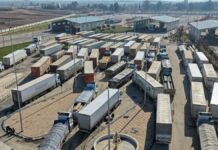
As the exodus of refugees fleeing Israeli bombardment in Lebanon intensifies, many are forced to navigate a perilous journey back into Syria, only to face exploitation at the hands of various factions controlling the country’s fractured territories.
Crossing into Syria from Lebanon has become increasingly treacherous for returning Syrians, who often have no choice but to pay steep bribes to pass through multiple checkpoints. These checkpoints, controlled by Assad regime forces, the Syrian Democratic Forces (SDF), and Syrian National Army (SNA) groups, have become notorious for extortion.
Khaled Masoud, a Syrian refugee who recently crossed from Lebanon into northern Syria with his family, described the grueling ordeal. “It took us seven days and over $1,300 to make it here,” he said. “Every checkpoint demanded money. We were lucky to arrive safely.”
The Assad regime has been accused of turning the return of refugees into a profitable business, especially for those crossing back into liberated areas. At checkpoints like Aoun Al-Dadat, which connects regime-controlled territory to SIG-controlled Jarablus, refugees are often required to pay hundreds of dollars to pass. Families report paying between $300 and $600 at various stops on their journey.
In some cases, crossing into SDF-controlled areas in northeastern Syria presents an even higher risk. Local militias have been accused of detaining refugees, particularly young men, for forced conscription or political reasons. Hazaa Al-Zakuri, a local militia leader controlling part of the Aoun Al-Dadat crossing, has been reported to run a smuggling ring, taking advantage of those desperate to escape the ongoing conflict in Lebanon.
Humanitarian organizations estimate that security forces have already extorted more than a million dollars from refugees since the escalation of the Israeli conflict. For many of these displaced people, the exorbitant fees are unaffordable, pushing them into even deeper poverty as they seek safety.
Despite the risks, many refugees choose this route to avoid passing through regime-controlled checkpoints, where they fear arrest or worse. “People are scared, tired, and desperate to find a place to stay,” said Hadi Othman, a 20-year-old refugee who also made the dangerous journey back to his hometown of Binnish in Idlib. “We had no other option.”








